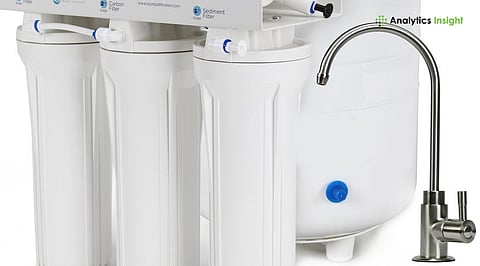

Under-sink filtration delivers clean drinking water while cutting daily wastage, making it a smart upgrade for water-conscious homes.
Different systems suit different sources; matching TDS levels, tank size, and purification stages ensures reliable long-term performance.
Modern under-sink purifiers save space, reduce clutter, and provide steady, great-tasting water for kitchens of all sizes.
For households drawing water from municipal lines, filtration systems brings a tidy setup that barely needs attention. Carbon cartridges tackle chlorine, lingering aftertaste, and routine chemicals, giving a cleaner edge to home cooking and daily drinks.
Their application and usage stretch replacement cycles and reduce waste. Let’s take a look at the best water-saving under-sink filtration systems, along with their benefits and features.
Also Read: Top Amazon Deals on Must-Have Home Appliances, Grab Up to 50% Off
KENT Sterling Plus ensures that homes receiving a mix of municipal, tanker, or borewell supply benefit from adaptable purification. The combination of RO, UV, UF, and TDS control in this system maintains consistent output for different types of water.
The flow of 20 LPH ensures smooth daily use while maintaining steady availability with the 6-litre tank. The TDS controller removes salts and microbial contaminants while retaining essential minerals for balanced and dependable water quality.
For households concerned about water wastage resulting from RO systems, this model reduces reject water through Side Stream RO membrane technology. The design allows more input water to be channelled for purification, hence increasing efficiency.
Mineraliser technology maintains a clean, natural taste. A 5-litre tank and LED indicators offer simple, clear usability. Ideal for setups requiring RO performance with lower water loss.
In tall buildings, the weak inlet pressure disrupts the water line often. This purifier counters the problem with a zero-pressure pump and an 8-litre tank that ensures smooth output even when the pressure dips.
The nine-stage purification addresses bacteria, viruses, and dissolved contaminants to ensure dependability in quality. A smart water-saving feature limits daily wastage, offering solid value where supply remains tight.
High levels of TDS in groundwater require a system constructed for tough conditions. This model handles TDS up to approximately 3000 through a seven-stage setup, including copper alkaline enhancement for taste and mineral balance.
Family use is supported by a 10-litre tank, and the ISI certification adds to the trust. Households can find a practical choice in UTS Black for tackling hard borehole water with a controlled budget.
Large families and high-usage kitchens benefit from spacious storage. This 12-litre tank reduces purification cycles and lowers overall water loss. RO, UV, and UF stages remove heavy metals and microbial contaminants, while food-grade tank material protects stored water. Compatibility with TDS levels up to about 3500 makes this system suitable for severe borewell conditions.
Livpure Stealth is a clean, minimal kitchen setup that pairs well with this compact under-counter purifier. The super sediment stage shields the main filters, extending their life and easing maintenance.
This model’s 7-litre tank and approx. 15 LPH flow supports daily needs without interruptions. The design balances appearance and dependable performance, fitting seamlessly into modern kitchen layouts.
Also Read: Best Water Purifier Under Rs. 20,000
Accurate TDS readings, family size, tank capacity needs, filter availability, and installation quality determine real-world performance. Matching these factors ensures safe, great-tasting water with far less waste.
Local water behaviour also plays a role, as different areas have different levels of hardness and contamination. Looking at long-term service costs helps understand how well the purifier will hold up during everyday use.
1. What is the main benefit of an under-sink filtration system?
It stays hidden, frees up counter space, and delivers steady purified water through a dedicated faucet.
2. Can under-sink purifiers handle borewell or tanker water?
Models with RO, UV, UF, and TDS control can manage high TDS and impurities found in borewell and tanker supply.
3. Why is TDS important when choosing a purifier?
TDS helps decide if RO is needed. High TDS requires RO, while low TDS can work well with carbon or UV filters.
4. How often should filters be replaced?
Replacement depends on water quality and usage. Carbon filters usually last months, while RO membranes last longer.
5. Do under-sink RO systems waste less water now?
Yes. Units like AO Smith Z2+ and Aquaguard Select Designo use improved RO membranes that reduce reject water.
